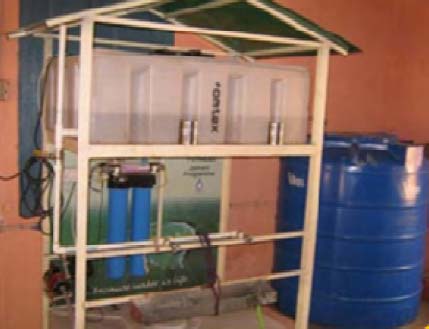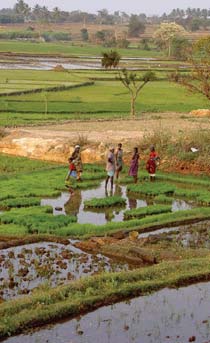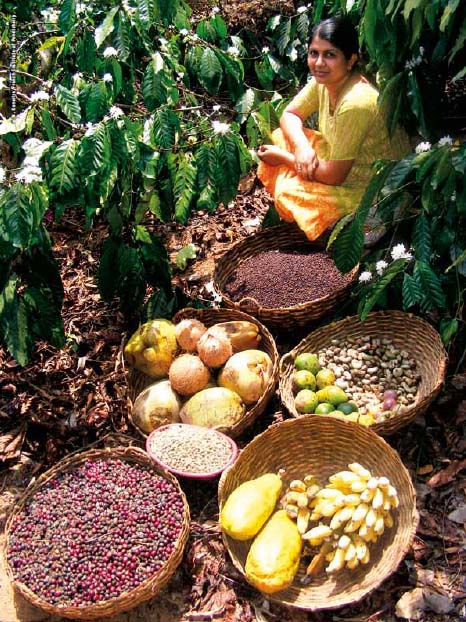/topics/conservation-reducing-water-usage
Conservation - Reducing Water Usage
Forecasting agricultural output using space, agrometeorology and land based observations
Posted on 03 Sep, 2011 06:29 PMThis document presents the proceedings of the annual review meeting by India Meteorological Department (IMD) on “Forecasting Agricultural Output Using Space, Agrometeorology and Land Based Observations” (FASAL) organized at YASHADA, Pune during 1-2 August 2011.
Assessment of Jalamani programme on stand alone water purification systems in rural India - A report by Centre for Media Studies
Posted on 03 Sep, 2011 04:50 PM This report by the Centre for Media Studies, New Delhi presents an assessment of the Jalamani programme of the Department of Drinking Water Supply, Government of India. The centrally sponsored programme commenced in 2008-09 aimed at installing simple Stand Alone Water Purification Systems (SAWPS) in rural schools to enable school children to have access to safe and clean water. The focus was on tackling bacteriological contamination and turbidity in ongoing rural drinking water supply programme.
This report by the Centre for Media Studies, New Delhi presents an assessment of the Jalamani programme of the Department of Drinking Water Supply, Government of India. The centrally sponsored programme commenced in 2008-09 aimed at installing simple Stand Alone Water Purification Systems (SAWPS) in rural schools to enable school children to have access to safe and clean water. The focus was on tackling bacteriological contamination and turbidity in ongoing rural drinking water supply programme.
The assessment study used both qualitative and quantitative techniques such as focus group discussions and in-depth interviews besides structured questionnaire for a variety of stakeholders and research questions. Another important aspect of the quantitative tools was testing of the raw and treated water samples. The study was undertaken in 320 schools spread across 20 districts and six states.
Faster, sustainable and more inclusive growth – An approach to the twelfth five year plan – Draft report by Planning Commission
Posted on 03 Sep, 2011 09:28 AMThis draft report by the Planning Commission, which presents an approach to the twelfth five year plan among other things outlines some of the challenges related to agriculture, natural resources management and water resources management.
Communal toilets in urban poverty pockets - A WaterAid report
Posted on 02 Sep, 2011 12:39 PMThis report published by WaterAid describes the findings of the study conducted in seven poverty pockets in Bhopal to look at patterns of use of communal latrine facilities. Much has been invested in building communal and public toilets and more resources are likely to continue to support this form of sanitation in dense urban areas in India.
However, there is no evidence available that is needed to quantify their potential contribution to reducing open defecation and faecal pollution in these environments, and identify those design features and management factors that encourage the highest usage rates by all household members. Also there is no information available on the impact of age and gender related differences in patterns of use.
Social equity and integrated water resources management – A background paper by Global Water Partnership
Posted on 31 Aug, 2011 04:10 PMIt provides an analytical framework that policy makers and water professionals can use to bring greater clarity to the issue of social equity in their local context.
Adaptive water resource management in the Lower Bhavani project command area in Tamil Nadu – A research report by IWMI
Posted on 25 Aug, 2011 11:07 PM
To what extent farmers and water resource managers already practice adaptive management and whether it is practiced in an optimal manner or could there be areas for improvement based on recent advancements in the theory of adaptive management are some of the questions that are particularly appropriate in the light of rapid changes in river basin water use and also in relation to basin closure.
This paper draws on the development and use of water resources in the Lower Bhavani Project (LBP), with the LBP reservoir and the 84,000 hectare (ha) LBP command area. The project diverts water from the Bhavani River, a tributary of the Cauvery River in Tamil Nadu.
Groundwater, self-supply and poor urban dwellers - A review with case studies of Bangalore and Lusaka by IIED
Posted on 24 Aug, 2011 08:32 PMIt investigates the difficulties they face and emphasizes the need for better integration of groundwater in the planning and management of urban water resources.
Boundary concepts for interdisciplinary analysis of irrigation water management – A working paper by Peter Mollinga
Posted on 24 Aug, 2011 07:16 PMThe focus is concepts that capture the hybridity of irrigation systems as complex systems, and cross the boundaries of the natural and social sciences.
Payments for ecosystem services and food security – A report by Food and Agriculture Organisation
Posted on 24 Aug, 2011 06:08 PM Changing climate, loss of native forests, disappearance of biodiversity, water shortages, desertification, the reduction of natural soil fertility — all add to the scenario of a world with increasingly complex environmental challenges.
Changing climate, loss of native forests, disappearance of biodiversity, water shortages, desertification, the reduction of natural soil fertility — all add to the scenario of a world with increasingly complex environmental challenges.
The concept of Payment for Ecosystem Services (PES) has emerged as a challenge to the all-too-prevalent tradition of taking the Earth’s natural resources for granted. PES highlights a global continuum, illustrating the relationship between our lifestyles, the demands associated with our production and consumption patterns, and the effects those demands have on close or distant ecosystems.
Rajiv Gandhi National Drinking Water Mission – Report of an evaluation study by the Planning Commission (2010)
Posted on 23 Aug, 2011 10:17 PMThis evaluation study report by the Programme Evaluation Organisation, Planning Commission attempts to document the major achievements in rural water services under Rajiv Gandhi National Drinking Water Mission. It does so by assessing the extent of coverage and access to improved services in the rural areas.





